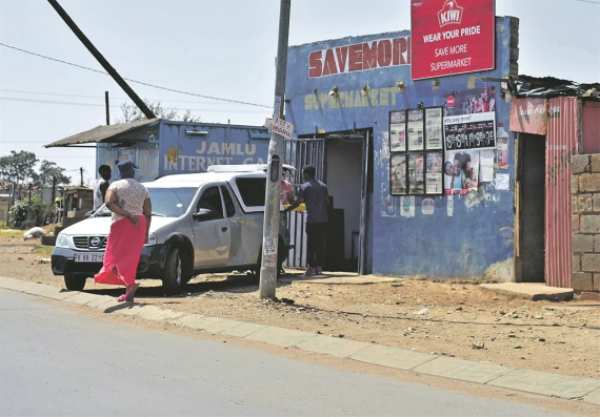Customers sit on chairs at Maponya Mall in Soweto as South Africans practice social distancing. Picture: REUTERS/Siphiwe Sibeko
Companies will be forced to reconsider their business models and become a lot more consumer-centric
As South Africans, we’re so used to being together. We’re very community orientated, whether it’s having friends, colleagues and family around or meeting up in malls, restaurants, schools and places of worship.
We are already replacing the new normal. To make the transition easier, our new way forward post lockdown means unlearning everything we know and learning new paths of behaviour.
Let’s have a look at some of the areas that are likely to be affected by social distancing:
Transportation
One of these new learnings must be public transportation, as it is an integral part of our community. Millions of our citizens rely on taxis, trains and buses to get to and from work, particularly as many work far from home.
Consider the trains, buses, taxis, and even the Gautrain, at peak hours. These transport systems will have to adapt to a new normal. It’s going to be interesting to see what additional protocols will be added.
The monitoring at the Gautrain station’s entrances and exits will need to be watched more closely and stringently. Airlines, which are currently grounded, will also have to adapt. One such solution is to allow passengers to only book aisle or window seats, leaving the middle seat open. This will of course have dire consequences for pricing and may lead to the permanent reconsideration of airlines and possibly a greater demand for private and chartered flights for individuals and corporations that can afford to pay a premium for that service.
Shopping centres
Shopping centres are going to be deeply affected by social distancing requirements, as malls by their very nature exist to attract a high number of consumers. The retail sector is also a big employer in the food, clothing and textile industries. It will be interesting to see how they regulate how many people can enter at a time and how each store implements social distancing once people are inside.
There will need to be a lot more sanitiser, and bathroom checks and cleaning protocols will need to be refined. The opportunity for a lot of the retailers will be around how to develop e-commerce platforms so that customers won’t have to leave home.
But that raises the question: will there be a need for malls in our new normal? We’ve seen during the lockdown how the Checkers Sixty60 app, for instance, has had a massive uptake, with online shopping at Woolworths and Pick n Pay also seeing a spike in activity.
Will others follow the trend to buy online? The big question, of course, is which malls will survive.
Restaurants
Restaurants play a big role in terms of people interacting and coming together. They, too, will be hugely impacted, as we’ve already seen from the lockdown. Will traditional restaurants that have not historically offered deliveries need to make this an added service? Will e-commerce be the new ecosystem in the years to come?
Restaurants form a huge part of the economy from an employment point of view. I believe the biggest change they will see is the drop in frequency of customers – both in the sit-down and quick-service restaurant categories.
Education
Educational institutions have also been affected, and what’s clear is that e-learning will be a strong consideration at least for the remainder of the year to supplement those going into classrooms. The department of basic education has indicated that it will phase in pupils going back, but I believe this will be short-lived. The biggest risk with children, especially younger kids, is that they naturally want to interact and play together – it will be extremely difficult to maintain social distancing for them.
The other complexity is that schools in the townships receive meals as part of a feeding scheme and those pupils depend on that meal for the day. Not being at school means that they miss a vital meal.
Tertiary education will be slightly easier to control as the challenges are different, but I believe that e-learning remains the best solution. The issue with this course of action is that data costs remain high and not everyone has access to the internet or computers and laptops at home.
Graduation ceremonies will also need to change – these could be spread out over two or three physical gatherings per year or be taken online.
The office
Within the corporate environment social distancing will also be a key requirement. Companies will need to adhere to the strict requirements as set out by the government of managing staff within the workplace. These include new regulations for having people in canteens, in boardrooms and staff meetings. We will also need to consider how the workplace is sanitised, particularly employers that have big numbers like retailers and mines.
Other corporates like banks will need to find ways for people to move in and out of their respective buildings. I think that after restrictions are lifted a lot of companies will need to limit the number of people coming into their buildings, with people working from home as much as possible.
Places of Worship
The other area that will be a big challenge is places of worship. SA is largely a Christian society, with lots of additional diverse religions. Most churches, synagogues and mosques encourage their worshippers to congregate at least once a week. During the lockdown some churches have resorted to online services, but the Zion Christian Church, for the first time ever, cancelled its Easter gathering at Moria, which attracts hundreds of thousands of people every year.
The biggest challenge for places of worship will be holding regular gatherings. People bring offerings like money that the churches need to sustain themselves. They will need to find other ways to help their members contribute to their expenses.
It will be interesting to see how places of worship evolve with new requirements of daily and weekly worship. Occasions like weddings, christenings and funerals will be affected. These will get smaller and smaller, with restrictions of only 50 people already in place for funerals. We will see an upsurge in cremations and streaming of services.
The event industry
Events will be the hardest hit, both from an attendance and revenue point of view. They are very dependent on a high number of attendees. SA is a sports-mad society and though pre-Covid attendance numbers were already dwindling, some games still attract a huge number of people. There will, of course, be a massive impact on these. Imagine a world without a Chiefs vs Pirates derby or an All Blacks vs Springboks rugby match. From a sponsorship point of view, brands will invest less and less in sponsorships, which will have a ripple effect on all events across the country, including at schools, sport clubs, and food and wine festivals.
Music events – and the arts and culture sector in general – will also be hard hit. A great example of innovation in the music industry is Channel O introducing a virtual “lockdown house party” event featuring popular DJs and up-and-coming DJs to play a one-hour set on Fridays and Saturdays. The channel has been extremely clever to bring in content relevant for this time: the shows have attracted a lot of viewers who may not have watched this channel before, and the DJs have had tremendous success from this initiative with the social media handles sometimes doubling after appearing on the show. It will be great to see this and other initiatives like it evolve and allow these platforms to gain some revenue.
The logistics industry
Social distancing will impact every aspect of society as we know it. It will force all of us to reset.
I believe there will be a huge increase in the use of and opportunities for logistics companies. For instance, there’s a lack of service in this category in the townships. This is a perfect time for Uber or a similar company to start a thriving delivery service to these areas.
We will be impacted by all our activities from Monday to Sunday and life will never be the same again. So who will the winner be? The biggest winners will be those that allow the democratisation of data, and hopefully we’ll see the government letting in more players in this space – data and access to the internet should become a human right.
Second, e-commerce is likely to thrive, and companies need to include markets that have been previously marginalised. All companies will be forced to reconsider their business models and become a lot more consumer centric, allowing for more entrepreneurs and preparing us for the fourth industrial revolution (4IR).
But it’s not actually about tech; it’s about companies coming up with solutions to solve consumer needs. Technology is an enigma but 4IR has to be about understanding the consumer’s pain points and coming up with solutions. This will be the centre of how companies reset for a new reality.
In times of difficulty and uncertainty there is always opportunity.
The MediaShop is a proud partner of the Future of Media 2020, brought to you by Arena Events. For more information about the Future of Media 2020, click here.
Maphai is MD of The MediaShop Johannesburg
Artcle Source: https://www.businesslive.co.za/redzone/news-insights/2020-05-12-social-distancing-the-new-normal/






